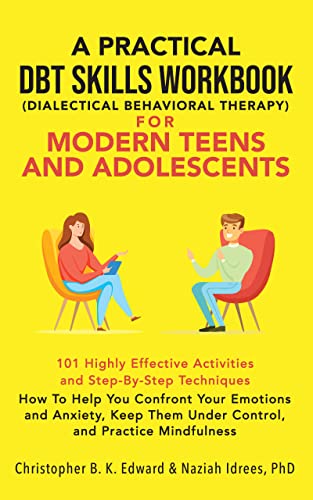
A Practical DBT Skills Workbook for Modern Teens & Adolescents: How to Help You Confront Your Emotions and Anxiety, Keep Them Under Control, and Practice Mindfulness by Christopher B. K. Edward
This therapeutic technique has helped Lady Gaga and Selena Gomez
get through the toughest times in their lives. Here’s how it can help you
too.
Your teenage years are a time of great change and new
experiences as you transition into adulthood.
You’re undergoing profound changes in your body, facing more
challenging ordeals, and feeling deeper emotions, you may not have felt before.
On top of that are the stresses of school, the complications
of teenage relationships and the
It can feel overwhelming to be a teen, and sometimes things
can get to be too much for you.
Whether you’re feeling hurt, stressed, insecure, angry,
anxious, or lonely, know that you don’t have to go through it alone.
You can always turn to your parents, friends, teachers, and
mentors for advice, support, and assistance.
But aside from outside help, you can also take actions to help yourself deal with the pressures of
teenage life.
One of the most effective ways is Dialectical Behavior
Therapy or DBT.
It is a form of cognitive-behavioral therapy that can aid
those struggling with various issues such as depression and anxiety, anger
outbursts, frequent mood swings, and more.
With this workbook, you’ll learn to develop useful skills to help you respond better to difficult and
stressful experiences.
In A Practical DBT skills Workbook for Modern Teens and
Adolescents, here is just a fraction of what you will discover:
●
A helpful overview of DBT, how it works, and how
it can improve your relationships and transform your life
●
The 4
core components of DBT and how each can contribute to your mental health
and wellbeing
●
How you can change the way you feel no matter
what situation you find yourself in using the Self-Soothe method
●
101 Fun
and productive exercises (Self-help Worksheets) to help you develop the DBT
skills you need to cope effectively with challenging situations
●
Emotion regulation techniques that give you more
understanding of and control over your emotions
●
How to apply GIVE skills to enhance the quality of your relationships
and deal with conflicts
●
How to use Distress tolerance skills to improve
your daily habits
●
Step-by-step 30-60-90-day plan to improve
your communication and relationships

